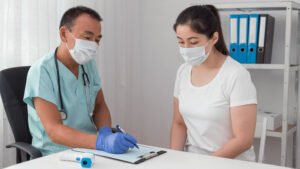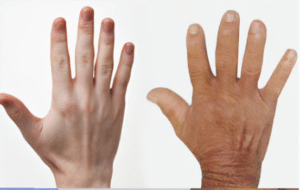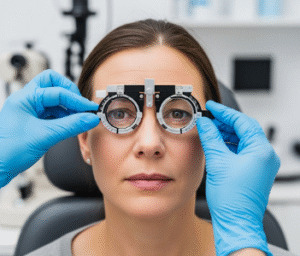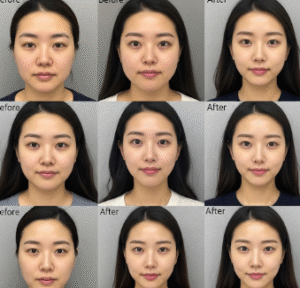Overview
Allergic rhinitis, often referred to as hay fever, is a common allergic condition that affects the nasal passages. It occurs when the immune system overreacts to allergens like pollen, dust mites, or pet dander. This leads to inflammation of the nasal lining, causing sneezing, congestion, runny nose, and itchy eyes. In South Korea, allergic rhinitis is increasingly prevalent due to urbanization, air pollution, and seasonal pollen surges—especially in spring and fall.
What is Allergic Rhinitis?
Allergic rhinitis is a hypersensitivity reaction involving the release of histamine and other chemicals in response to inhaled allergens. There are two main types:
- Seasonal Allergic Rhinitis (SAR): Triggered by outdoor allergens like pollen during specific seasons.
- Perennial Allergic Rhinitis (PAR): Caused by year-round allergens like dust mites, mold, or pet dander.
It often coexists with asthma and eczema and can significantly affect quality of life if untreated.
Symptoms
- Frequent sneezing
- Runny or stuffy nose
- Postnasal drip
- Itchy or watery eyes
- Itchy throat or ears
- Nasal congestion (often worse at night)
- Fatigue and irritability
- Decreased sense of smell
Symptoms may range from mild to severe and often mimic the common cold.
Causes
The primary cause of allergic rhinitis is the immune system’s hypersensitive response to airborne allergens. Common triggers include:
- Pollen (trees, grasses, weeds – especially in Korean spring/autumn)
- Dust mites
- Animal dander (cats, dogs)
- Mold spores
- Air pollutants and cigarette smoke
Risk Factors
- Family history of allergies, asthma, or eczema
- Living in urban areas with higher pollution levels
- Frequent exposure to indoor allergens (dust, mold, pets)
- Weakened immune system or early exposure to allergens in childhood
- Existing asthma or other allergic conditions
Complications
If left untreated, allergic rhinitis can lead to:
- Chronic sinusitis
- Ear infections (especially in children)
- Asthma flare-ups
- Poor sleep quality
- Decreased concentration or school/work performance
- Nasal polyps
Prevention
- Limit exposure to allergens: Use air purifiers, keep windows closed during high pollen seasons.
- Frequent cleaning: Vacuum and dust your home regularly.
- Use allergy-proof covers: For mattresses and pillows.
- Shower and change clothes after being outdoors during pollen season.
- Avoid smoking and secondhand smoke.
Treatment Options in Korea
South Korea provides a wide range of modern diagnostic and therapeutic options for managing allergic rhinitis. Treatment focuses on both symptom relief and long-term control:
1. Medications
- Antihistamines: Oral (e.g., loratadine, fexofenadine) or nasal spray (azelastine)
- Intranasal corticosteroids: Highly effective for nasal inflammation (e.g., fluticasone, mometasone)
- Decongestants: Short-term use for nasal congestion
- Leukotriene receptor antagonists: (e.g., montelukast) for combined allergic rhinitis and asthma
2. Immunotherapy
- Allergy shots (subcutaneous immunotherapy, SCIT) or sublingual tablets (SLIT)
- Helps reduce sensitivity to allergens over time
- Available in allergy departments of:
- Seoul Asan Medical Center
- Samsung Medical Center
- Severance Hospital Allergy & Immunology Clinic
3. Allergy Testing
- Skin prick testing
- Specific IgE blood tests
- Nasal cytology and endoscopy for complicated cases
4. Nasal Irrigation
- Saline nasal sprays or rinses to clear allergens and reduce inflammation
- Widely recommended and available over the counter in Korea
5. Environmental Management
- HEPA filters, dehumidifiers, and mold control strategies are commonly used in Korean homes
- Public awareness campaigns during high-pollen seasons by Korea Meteorological Administration













